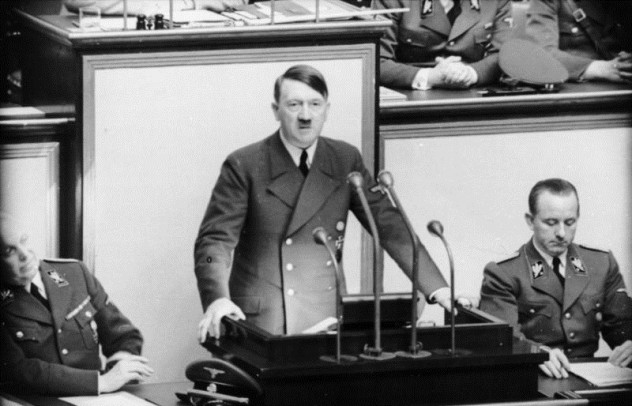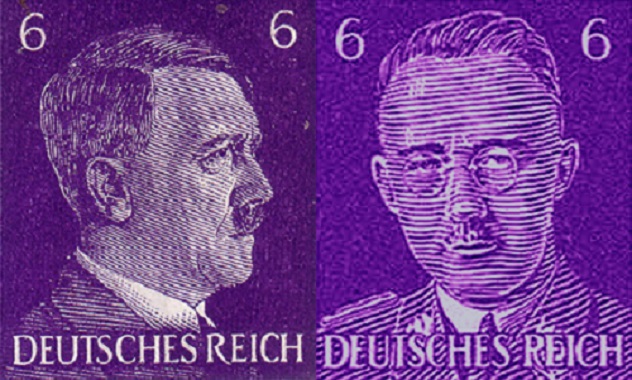 History
History  History
History  Weird Stuff
Weird Stuff 10 Wacky Conspiracy Theories You Will Need to Sit Down For
 Movies and TV
Movies and TV 10 Weird Ways That TV Shows Were Censored
 Our World
Our World 10 Places with Geological Features That Shouldn’t Exist
 Crime
Crime 10 Dark Details of the “Bodies in the Barrels” Murders
 Animals
Animals The Animal Kingdom’s 10 Greatest Dance Moves
 Movies and TV
Movies and TV 10 Box Office Bombs That We Should Have Predicted in 2025
 History
History 10 Extreme Laws That Tried to Engineer Society
 History
History 10 “Modern” Problems with Surprising Historical Analogs
 Health
Health 10 Everyday Activities That Secretly Alter Consciousness
 History
History 10 Dirty Government Secrets Revealed by Declassified Files
 Weird Stuff
Weird Stuff 10 Wacky Conspiracy Theories You Will Need to Sit Down For
 Movies and TV
Movies and TV 10 Weird Ways That TV Shows Were Censored
Who's Behind Listverse?

Jamie Frater
Head Editor
Jamie founded Listverse due to an insatiable desire to share fascinating, obscure, and bizarre facts. He has been a guest speaker on numerous national radio and television stations and is a five time published author.
More About Us Our World
Our World 10 Places with Geological Features That Shouldn’t Exist
 Crime
Crime 10 Dark Details of the “Bodies in the Barrels” Murders
 Animals
Animals The Animal Kingdom’s 10 Greatest Dance Moves
 Movies and TV
Movies and TV 10 Box Office Bombs That We Should Have Predicted in 2025
 History
History 10 Extreme Laws That Tried to Engineer Society
 History
History 10 “Modern” Problems with Surprising Historical Analogs
 Health
Health 10 Everyday Activities That Secretly Alter Consciousness
10 Bizarre Reasons Secret Plots Failed
There are many ways a covert operation can go wrong. Perhaps some tiny detail, unnoticed by the planners, will bring the whole thing tumbling down. Or maybe a painstakingly planned secret mission will be cancelled at the last second due to political interference or bureaucratic infighting. Sometimes, as the examples on this list will show, the reasons for a plan being called off can seem downright bizarre.
10 The CIA’s Poison Got Stuck To The Freezer

Listverse has previously discussed some of the CIA’s many, many terrible attempts to kill Fidel Castro, including the exploding cigar, poisoned fountain pen, and infected scuba gear. The closest the Agency came to assassinating the Cuban dictator actually involved an even more nefarious weapon—a poisoned milkshake.
The CIA knew that Castro loved to stop off at Havana’s Hotel Libre for a delicious shake. In 1964, the CIA used the Mafia as intermediaries to smuggle a cyanide pill to an underground Cuban opposition group. The Cubans had an inside man at the Hotel Libre (formerly the Havana Hilton) who would slip the pill into Fidel’s frozen treat. For ease of access, the would-be assassin decided to hide the pill in the freezer where the milkshake ingredients were kept.
The plan seemed to go off without a hitch. Castro arrived and ordered a shake from the mole, but when the killer went to retrieve the pill, he found that it had become stuck to the side of the freezer. Desperately trying to pry it free, he managed to tear the pill and spill the poison. After briefly trying to scoop the poison up of the floor of the freezer, the panicking assassin decided to call off the hit. Castro’s head of security would later estimate that there were over 600 attempts his life before he stepped down in 2008.
9 The British Decided Assassinating Hitler Would Actually Help The Nazis

The plan was as daring as it was simple. In the dead of the night, a small plane would fly over the Bavarian Alps. A British sniper and a Polish guide would parachute out wearing German military uniforms before making contact with a local inside man. Moving silently through the woods, they would infiltrate an isolated Nazi base used by Adolf Hitler. When Hitler went out for his early morning walk, the sniper would be hidden in the foliage overlooking the trail. He would pull the trigger once.
At least, that was the plan the British Special Operations Executive (SOE) came up with after capturing a former member of Hitler’s personal bodyguard. The prisoner told them about the Fuhrer’s early morning walks and the limited security at his Alpine retreat. The SOE’s planning department had actually suggested a number of different assassination plans—including a bazooka attack on Hitler’s favorite tea house and a full parachute assault by an SAS battalion—but decided on the sniper attack because it could be made to look as though it had been carried out by rogue elements of the German army.
Unfortunately, the plan was never carried out, after senior British commanders decided that killing Hitler was a bad idea. They argued that Hitler was such a terrible leader that killing him would actually help the Nazis. A senior SOE official suggested that the Fuhrer’s “strategic blundering made him more of an asset to the allies alive than dead,” while Winston Churchill himself argued that whacking Adolf would be “positively counterproductive.” There were additional worries that an assassination would create a new “stab-in-the-back myth” and turn Hitler into a martyr. The plan was quietly allowed to die.
8 An Anti-Nazi Assassin Got Stuck In A Toilet

An even earlier plan to kill Hitler occurred in 1929, four years before he took power as Chancellor of Germany. A disgruntled member of Hitler’s personal SS bodyguard, convinced that the man he had sworn to protect would be a disaster for Germany, planted a bomb under the platform where Hitler was scheduled to make a speech. The bomb needed to be manually detonated, but that wouldn’t be a problem for one of Hitler’s own guards. Unfortunately, the nervous would-be assassin decided to pay a quick visit to the little boy’s room before the speech.
After relieving himself, the bodyguard tried to return to his post, only to discover that he had somehow become locked in the bathroom. He shouted for help and threw himself against the door, but couldn’t get out before it was too late. It’s strange to think that the horrors of World War II and the Holocaust might all have been avoided if not for one faulty bathroom lock.
7 Washington Tried To Steal Gunpowder Franklin Had Already Stolen

In October 1775, a small flotilla of American ships slid silently into the waters off Bermuda. They had been sent by George Washington himself on a top-secret mission of the utmost importance. The Continental Congress was running dangerously low on gunpowder and other vital supplies, but Washington knew that there was a well-stocked British arsenal in Bermuda. He also knew that the people of Bermuda were suffering terribly from the British embargo on American exports, especially foodstuffs. Washington decided to gamble that the Bermudans would be willing to look the other way while his men stole the gunpowder.
The plan seemed to go wrong from the start. Washington’s men found that Bermuda, usually an ignored backwater, was swarming with British ships. When they managed to make contact with some locals, they discovered the reason: the gunpowder had already been stolen—by the Americans.
As it turned out, while Washington had been hatching his scheme, Ben Franklin had been doing exactly the same thing. Conspiring with the father of Bermuda’s governor, Franklin had arranged for food to be smuggled from South Carolina to Bermuda. In exchange, the Bermudans agreed to look the other way while Franklin’s men looted the arsenal. Secretly breaking a hole in the armory roof, they lowered in an American sailor, who opened the doors from the inside. Washington’s gamble would have paid off—he was just a month too late.
6 MI5’s Fear-Detecting Gerbils Didn’t Get The Concept

Back in the ’70s, British counterintelligence agency MI5 were strong contenders for least competent spy organization in the world. They never uncovered a Soviet agent on their own initiative and were heavily infiltrated by moles. Then they suddenly hit upon a potentially devastating new weapon—the sniffer gerbil. It turned out that gerbils could smell human adrenaline, and even detect rises in it. The idea was to use the cuddly rodents as living lie detectors in interrogations.
An even crazier plan was to put cages of gerbils at all airports and then use huge fans to blow the smell of passengers at them. The gerbils would be able to sniff out spies and terrorists, who would obviously be more nervous than other passengers. The Israeli Shin Bet agency actually put this scheme into operation at Tel Aviv airport, but were forced to abandon it when it was awkwardly discovered that the gerbils couldn’t tell the difference between adrenaline produced by a nervous hijacker and adrenaline produced by someone afraid of flying or lifting a heavy suitcase. Meanwhile, MI5 also worked out that the animals were just pressing the lever in response to any change in adrenaline, making them pretty useless in an interrogation. They went back to just using lie detectors instead.
5 A Corporate Spy Forgot To Delete His Social Networking Accounts

Environmental protest group Plane Stupid campaigns against airport expansion in the UK. In 2007, the group gained an enthusiastic new member calling himself “Ken Tobias.” However, the group soon became suspicious of Tobias, partly on the basis that “he always turned up first to meetings . . . and was too well dressed,” which isn’t going to do anything to combat stereotypes around environmentalists.
More seriously, Tobias was always pushing for the group to take more disruptive, possibly violent actions and someone had started leaking these proposed plans to the press. Tobias had boasted about being a student at Oxford, so the group started passing his picture around the university and someone eventually identified him as Toby Kendall. This wasn’t damning in itself—many members of the group used pseudonyms—but a quick Google search turned up a Bebo page that identified Kendall as an employee of a corporate security firm named C2-I, which specialized in the aerospace industry. This isn’t exactly an isolated incident—corporate security company Vericola’s infiltration of an environmentalist group was revealed when the CEO began accidentally copying all of her emails to the group’s account.
4 Britain’s Friendly Propaganda Was Accidentally Turned Into Bombs

During the Suez Crisis, Britain, France, and Israel attacked Egypt with the goal of regaining control over the Suez Canal, which Egypt had recently naturalized. The incident was a public relations disaster, as it was widely seen as a colonial-style infringement on Egypt’s sovereign rights by the Western powers. US condemnation eventually forced a complete withdrawal. Of course, Britain’s attempt to portray the attack as a peaceful and necessary intervention wasn’t helped by the ineptitude of their propaganda department.
The department was run by Lieutenant Colonel Bernard Fergusson, who had no previous experience in psychological warfare. His main task was to convince ordinary Egyptians to support the invasion, or at least not to oppose it. To this end, he ordered that leaflet bombs be dropped over Egyptian villages. The bombs would detonate more than 300 meters (1,000 ft) in the air, showering the area below with leaflets promising that the intervention was meant to stop the spread of communism and would make the Egyptians’ lives better. Unfortunately, the bomb’s designers had failed to take into account barometric differences between Egypt and England. As a result, the bombs actually detonated about 2 meters (6 ft) off the ground—which you might recognize as around head-height.
3 The Soviet Union’s Cheap Staples Were Their Greatest Weapon

During World War II, the German intelligence apparatus figured that it should be fairly easy to infiltrate a few spies into the Soviet ranks. After all, the Soviet military was both huge and inefficient, how hard could it be? To their surprise, their agents kept getting caught almost as soon as they crossed into enemy lines. Did the Soviets have some fiendishly efficient spy-catching organization?
Well, not quite. You see, the Germans had gone to great lengths to forge painstakingly accurate Soviet passports for their agents. What they never realized was that actual Soviet passports were made with cheap iron staples that rusted and left huge brown marks on the paper. The German forgeries used stainless steel staples, which didn’t leave rust marks, rendering the passports instantly suspicious to the first guard who checked them.
Amazingly, this flaw was never discovered—and after the war, the Americans started making the same mistake. During the 1950s, the CIA recruited agents among Soviet refugees in the West. These sleeper agents, usually Ukrainian, were parachuted into the Soviet Union with orders to carry out sabotage and build a resistance movement. Unfortunately, their CIA-issued false passports also used stainless steel staples and they were mostly arrested immediately.
2 British Intelligence Launched A Plot So Subtle No One Noticed It

During World War II, the British Special Operations Executive (SOE) hatched a devious plan to undermine the German war effort. They knew that SS boss Heinrich Himmler was extremely unpopular compared to other Nazi leaders. They also knew that Himmler was seen as extremely ambitious and that some Nazis were worried he might try to replace Hitler. The SOE realized that if they could fuel these rumors, they might be able to cause infighting that would destabilize the whole Nazi leadership—but they would have to be extremely subtle to avoid detection.
The plan they came up with was to forge fake German postage stamps with Himmler’s face instead of Hitler’s. When people saw the new stamps, they would assume that Himmler was plotting to take power and that the stamps had accidentally been released early. Britain’s finest forgers were assigned to work on the stamps, which were perfect imitations of actual German stamps. The forgeries were distributed throughout Europe, and the SOE sat back and waited to see the results of their plan. And they kept on waiting.
No one noticed. People just used the stamps as if nothing were unusual about them. Eventually, the SOE resorted to having agents physically walk into German stamp-collecting shops and point out the weird stamps. Even then, the stamp-collectors just assumed that the stamps had been issued to honor Himmler.
One government was actually completely fooled. Unfortunately, it was the American government, whose Swiss embassy sent a copy of the mysterious stamps back to Washington. Since the British hadn’t bothered telling their allies about the scheme, American agents ended up spending time and money investigating the nonexistent “stamp mystery.”
1 Russia’s Greatest Mole Was Caught Because Of His Racism

Robert Hanssen remains one of the most successful and infamous spies in Cold War history. Joining the FBI in 1976, he was soon assigned to monitor a Soviet agent attached to the embassy in New York. Instead, he walked up to his target, introduced himself, and offered to become a spy in exchange for money. His betrayal went undetected for 22 years and did an estimated $44 billion in damages to the US government, but far worst was the human cost. One of his first acts as a spy was to reveal that Soviet Major General Dimitri Polyakov had been passing information to the CIA. Polyakov was arrested and executed.
A dour, humorless man, considered a bit strange by his co-workers, Hanssen survived numerous close calls. On one occasion, he was found to have hacked into another agent’s computer, but insisted he just did it to expose security flaws. Later, he was detected uploading a password-cracking program onto his FBI computer. Amazingly, his explanation—that he was just trying to hook up a printer and had forgotten the administrative password—was accepted. When the FBI became aware that they had a mole, Hanssen was one of the people assigned to look for him. It began to seem as though he would never be caught—and he probably wouldn’t have been, if not for his weird brand of racism.
By 2000, the FBI had come to believe an innocent man, Brian Kelley, was the mole but were frustrated by their inability to prove anything. They even resorted to sending a man with a fake Russian accent to Kelley’s house to warn him that his cover had been blown. They were hoping he would incriminate himself by making a run for it, but Kelley—confused and with nothing to hide—reported the incident instead.
Then the agency got a break. A former Russian spy offered to sell them a tape of the mole’s voice. The voice on the tape clearly wasn’t Kelley’s and it seemed briefly that the investigation was back to square one. Then the voice started ranting about beating the tar out of the “purple-pissing Japanese,” a bizarre racial slur originating with George Patton and frequently used by Robert Hanssen. He was arrested and eventually handed 15 consecutive life sentences without the possibility of parole.
Alex is a Sumerian fire demon who grants wishes. Follow him on Twitter.







